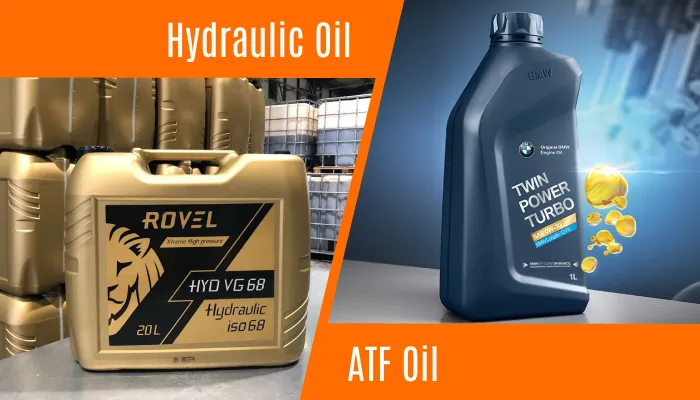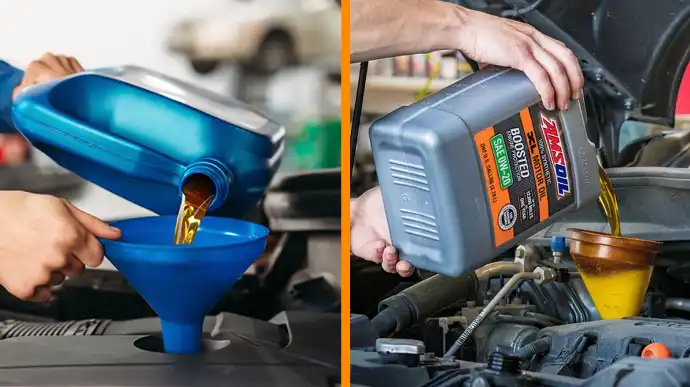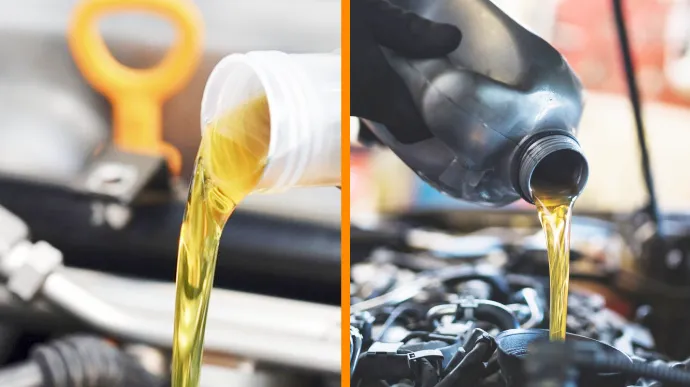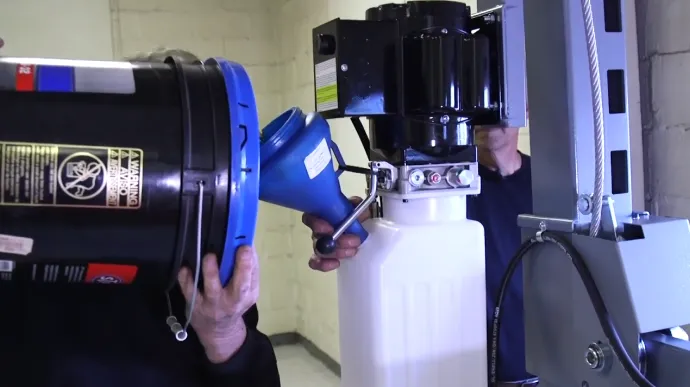Physical Address
304 North Cardinal St.
Dorchester Center, MA 02124
Physical Address
304 North Cardinal St.
Dorchester Center, MA 02124

In a vehicle, hydraulic oil and engine oil are two essential oils that are used in different components and parts. Although both oils are lubricants, they’re completely different. Impact-Site-Verification: 83b10713-7308-4587-b1be-35cf1c2938ea.
Engine oil serves to clean and protect the engine’s internal combustion chamber, whereas hydraulic oil is a non-flammable fluid.
Also, the composition of hydraulic oil differs from engine oil. Hydraulic oil consists of 99% base oil and 1% additives, while engine oil consists of 70-90% base oil and 10-30% additives.
Throughout this article, we will discuss the differences between hydraulic oil and engine oil. So, let’s explore these oils for proper usage.

When considering the differences between hydraulic oil and engine oil for vehicles, there are several key points to consider.
Hydraulic oil is designed to meet the demands of hydraulic systems found in heavy machinery, industrial equipment, and hydraulic power units along with the vehicle hydraulic system. Its primary function is to transmit power, lubricate components, and transfer energy efficiently within the hydraulic system.
On the other hand, engine oil, also known as motor oil, is formulated to cater to the needs of internal combustion engines. It serves multiple purposes, including lubricating engine parts, cooling and cleaning the engine, and reducing friction and wear.
Let’s examine the ingredients and proportions of hydraulic oil and engine oil for a better understanding of their differences. Hydraulic oil primarily comprises 99% base oil and 1% additives. This composition prioritizes efficient energy transfer and system protection.
Meanwhile, engine oil has a more complex composition. It comprises 70-90% base oil and 10-30% additives. These additives play a crucial role in meeting the demands of internal combustion engines. They include anti-wear agents, detergents, and viscosity improvers.
Hydraulic oil typically has a lower viscosity compared to engine oil. This is because hydraulic systems require smooth fluid flow to operate efficiently. The thinner consistency of hydraulic oil allows it to flow easily through the system, enabling quick and precise movements of hydraulic components.
Conversely, engine oil has a higher viscosity to create a durable lubricating film on engine components. This film protects the engine from wear and tear, especially under high temperatures and pressures. Because engine oil is viscous, it adheres to engine parts effectively, reducing friction and maximizing engine performance.
Hydraulic oils typically contain additives that enhance their anti-wear, anti-foaming, and anti-corrosion properties. These additives are carefully formulated to resist oxidation and maintain a stable viscosity over time, ensuring optimal performance of hydraulic systems.
Alternatively, engine oils have many additives that improve their overall performance. These include detergents to clean the engine, dispersants to suspend contaminants, anti-wear additives, and anti-foaming agents. Also, engine oils have specific additives to enhance thermal stability and resistance to oxidation.
Hydraulic oils are designed to work within a specific temperature range of -110°F to 130°F (-43°C to 55°C). They aren’t intended to handle the extreme temperature variations that engine oils can withstand.
In contrast, engine oils are formulated to operate in a broader temperature range. They can handle temperatures ranging from 93°C to 110°C (200°F to 230°F) for diesel-powered engines and even higher temperatures of 110°C to 126.6°C (230°F to 260°F) for gasoline vehicles or specialized applications.
The high temperatures generated by engine combustion require engine oils to have the ability to withstand and maintain their performance under these extreme conditions.
Hydraulic oil is commonly used in equipment such as hydraulic brakes, power steering systems, excavators, backhoes, and transmissions. It has excellent anti-wear properties, which protect the components from damage due to metal-to-metal contact.
Engine oil, on the other hand, needs to provide superior lubrication to various engine components, such as pistons, crankshafts, camshafts, and bearings. It forms a durable oil film that prevents metal-to-metal contact and reduces friction, ensuring smooth operation and protecting against wear and tear.

Hydraulic oil is designed to have a low compressibility, which means it’s highly resistant to changes in volume under pressure. This characteristic allows hydraulic oil to transmit energy and maintain pressure levels within hydraulic systems efficiently.
However, engine oil has a certain degree of compressibility to accommodate the varying pressures and temperatures within an internal combustion engine. This compressibility allows the engine oil to adapt to changing conditions and provide adequate lubrication to the engine components.
Hydraulic oil is designed to quickly separate from water, ensuring its effectiveness in the presence of moisture. This is crucial in hydraulic systems where water contamination can be detrimental.
Conversely, engine oil isn’t as efficient at separating from water and may emulsify with it. This can lead to various issues, such as reduced lubricity and filterability. In the engine, emulsification of engine oil with water can result in corrosion and cavitation.
The flash point refers to the temperature at which a substance can ignite when exposed to an open flame or spark. Hydraulic oil generally has a lower flash point compared to engine oil.
This means that hydraulic oil is more prone to ignition, making it a potential safety concern, especially in high-pressure hydraulic systems where fire hazards may exist.
Alternatively, engine oil has a higher flash point, making it less likely to ignite. This property is crucial for the safety of internal combustion engines that operate at high temperatures.
In hydraulic systems, hydraulic oil is specially formulated to remove contaminants efficiently, ensuring clean hydraulic fluid and minimizing wear. It contains additives that act as detergents and dispersants, effectively trapping and suspending contaminants to prevent them from settling in the system.
However, engine oil is designed to clean engine components by removing dirt and contaminants generated during combustion. It contains detergents and additives that help dissolve and disperse these contaminants, preventing build-up and maintaining engine performance.
| Properties | Hydraulic Oil | Engine Oil |
| Composition | 99% Base oil, 1% additives | 70-90% Base oil, 10-30% additives |
| Viscosity | Lower viscosity | Higher viscosity |
| Additives | Anti-wear, anti-foaming, anti-corrosion | Detergents, dispersants, anti-wear, anti-foaming, thermal stability, oxidation resistance |
| Temperature Range | 43°C to 55°C (-110°F to 130°F) | Diesel: 93-110°C (200-230F), Gasoline: 110-126.6°C (230-260F) |
| Lubrication Properties | Reduce friction, efficient power transmission | Superior lubrication protect against metal-to-metal contact |
| Fluid Compressibility | Less compressible | Certain degree of compressibility |
| Emulsification Tolerance | Separates quickly from water | May emulsify with water |
| Flash Point | Lower flash point | Higher flash point |
| Contaminant Removal | Efficient removal of contaminants | Removes dirt and contaminants generated during combustion |
Engine oil and hydraulic oil aren’t the same lubricants. While both serve the purpose of lubricating, they’ve distinct characteristics and functions.
Engine oil is specifically formulated to lubricate the internal components of an engine, such as the pistons, bearings, and camshaft. Conversely, hydraulic oil is primarily used in hydraulic systems to transmit power and lubricate the moving parts of the system, such as pumps, valves, and cylinders.

If you accidentally use hydraulic oil instead of engine oil, you may experience detrimental effects on your engine’s performance and longevity.
Hydraulic oil is specifically formulated to provide high-pressure lubrication and transmit power in hydraulic systems. It isn’t designed to withstand the high temperatures and shear forces that occur in an engine.
Using hydraulic oil in an engine can lead to inadequate lubrication and increased wear on the engine’s moving parts. Also, the viscosity of hydraulic oil can cause clogging and blockage of the engine’s oil passages, reducing oil flow and further compromising engine performance.
You must understand the differences between hydraulic and engine oil for optimal vehicle performance and to avoid damaging your machines and compromising safety.
Hydraulic and engine oil may seem similar at first glance, but they have distinct differences that one should be aware of. While engine oil is used for engines, hydraulic oil is used in hydraulic systems.
Therefore, use the appropriate oil for the right purpose. Consult the manufacturer’s recommendations or seek professional advice from a lubricant expert. With the right oil, you can enhance your machine’s performance, prolong its lifespan, and save costs.